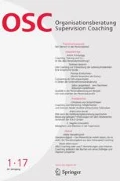Zusammenfassung
In dem Artikel wird ein neues Orientierungsmodell für Führungsentwicklung vorgestellt: die Führungsholarchie. Anhand der Führungsholarchie kann die Wahrnehmung des Beraters für Herausforderungen und Grenzen in der Entwicklung von Führungskräften und Führungsteams geschärft werden. Das Modell kann als Diagnoseinstrument in Beratung und Forschung und für die Planung von Entwicklungsmaßnahmen genutzt werden. Aufbauend auf neueren Erkenntnissen über Persönlichkeitsentwicklung im Erwachsenenalter werden verschiedene Entwicklungsstufen von Führung unterschieden. Neben der Skizze des Modells werden die theoretischen Bezugspunkte in der Entwicklungstheorie und der aktuellen Führungsforschung dargestellt. Der Autor vertritt die Ansicht, dass sich anhand einer expliziten entwicklungstheoretischen Betrachtung von Führung neue Perspektiven für Coaching und Beratung eröffnen.
Abstract
The article presents a new model for leadership development: the leadership holarchy. The leadership holarchy can provide orientation in the developmental process and can sharpen the awareness of the coach for challenges and limits in the development of a leader. The model can be used as a diagnostic instrument in consulting and research and for the planning of trainings and seminars. Based on recent literature from personal development in adulthood, different stages of leadership development are described. In addition to the leadership holarchy, the article depicts the points of reference in developmental theory and theory of leadership. The author holds the view that an explicit development-based approach on leadership opens up new perspectives for coaching and consulting.
Literatur
Argyris, C., & Schön, D. A. (1974). Theory in practice. San Francisco: Jossey-Bass Publishers.
Bleicher, K., & Meyer, E. (1976). Führung in der Unternehmung. Reinbek: Rowohlt.
Eigel, K. M., & Kuhnert, K. W. (2005). Authentic development: ledership development level and executive effectiveness. Monographs in Leadership and Management, 3, 357–385.
Fuhr, R. (2001). Ansätze einer Entwicklungstheorie für die Gestalttherapie. In R. Fuhr, M. Srekovic, & M. Gremmler-Fuhr (Hrsg.), Handbuch der Gestalttherapie (S. 575–598). Göttingen: Hogrefe.
Glasl, F., & Lievegoed, B. (1993). Dynamische Unternehmensentwicklung (3., überarb. und erw. Aufl.). Bern: Haupt.
Höhn, R. (1970). Verwaltung heute: Autoritäre Führung oder modernes Management. Bad Harzburg: Verlag für Wissenschaft, Wirtschaft und Technik.
Kegan, R. (1986). Die Entwicklungsstufen des Selbst. Fortschritte und Krisen im menschlichen Leben. München: Kindt.
Kegan, R., & Laskow Lahey, L. (2009). Immunity to change. Boston: Harvard Business Press.
Malik, F. (2000). Führen, Leisten, Leben. München: Heyne.
McCauley, C. D., Drath, W. H., Palus, C. J., O'Connor, P. M. G., & Baker, B. A. (2006). The use of constructive-developmental theory to advance the understanding of leadership. The Leadership Quarterly, 17, 634–653.
Rooke, D. & Torbert, W. R. (1998). Organizational transformation as a function of CEO's developmental stage. Organization Development Journal, 16(1), 11–28.
Rooke, D., & Torbert, W. R. (2005). Seven transformations of leadership. Harvard Buiseness Review, 83(4), 66–76.
Schein, E. (2003). Organisationskultur. Bergisch Gladbach: EHP.
Senge, P. M. (1996). Die fünfte Disziplin : Kunst und Praxis der lernenden Organisation. Stuttgart: Klett-Cotta.
Servatius, H.-G. (1991). Vom Strategischen Management zur Evolutionären Führung. Stuttgart: Poeschel.
Weick, K. E., & Sutcliffe, K. M. (2003). Das Unerwartete managen. Stuttgart: Klett-Cotta.
Willms, J. (2004). Führungsmodelle in der Organisationsentwicklung unter integraler Perspektive (No. 27). Göttingen: Pädagogisches Seminar der Universität Göttingen.
Author information
Authors and Affiliations
Corresponding author
Rights and permissions
About this article
Cite this article
Willms, J. Neue Perspektiven in der Führungsentwicklung. Organisationsberat Superv Coach 17, 269–280 (2010). https://doi.org/10.1007/s11613-010-0197-6
Published:
Issue Date:
DOI: https://doi.org/10.1007/s11613-010-0197-6

